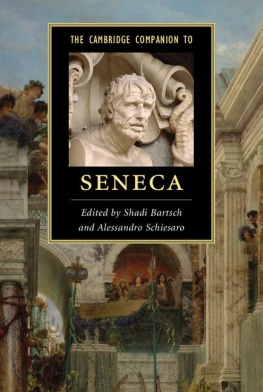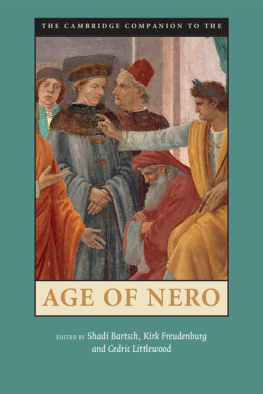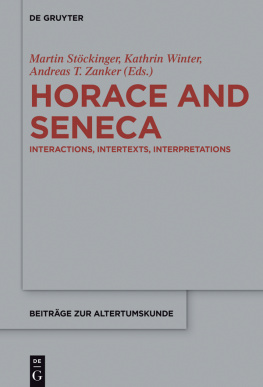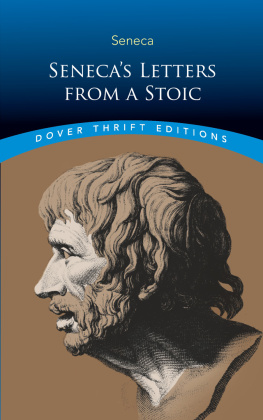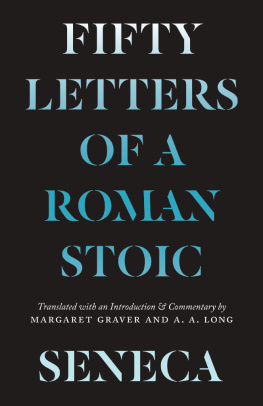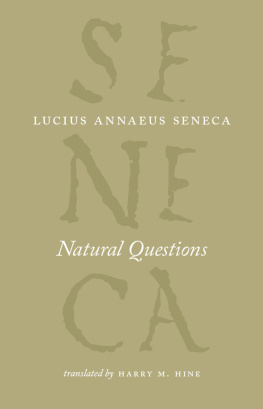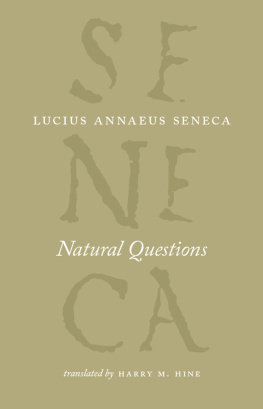For a list of titles published in the series, please see .
32 Avenue of the Americas, New York, NY 10013-2473, USA
Cambridge University Press is part of the University of Cambridge.
It furthers the Universitys mission by disseminating knowledge in the pursuit of education, learning, and research at the highest international levels of excellence.
www.cambridge.org
Information on this title: www.cambridge.org/9781107694217
Cambridge University Press 2015
This publication is in copyright. Subject to statutory exception and to the provisions of relevant collective licensing agreements, no reproduction of any part may take place without the written permission of Cambridge University Press.
First published 2015
Printed in the United States of America
A catalog record for this publication is available from the British Library.
Library of Congress Cataloging in Publication Data
The Cambridge companion to Seneca / edited by Shadi Bartsch, University of
Chicago; Alessandro Schiesaro, Sapienza University of Rome.
pages cm. (Cambridge companions to literature)
Includes bibliographical references and index.
ISBN 978-1-107-03505-8 (hardback) ISBN 978-1-107-69421-7 (paperback)
1. Seneca, Lucius Annaeus, approximately 4 B.C.65 A.D. History
and criticism Handbooks, manuals, etc. I. Bartsch, Shadi, 1966 editor.
II. Schiesaro, Alessandro, 1963 editor.
PA6675.C36 2015
188dc23 2014033239
ISBN 978-1-107-03505-8 Hardback
ISBN 978-1-107-69421-7 Paperback
Cambridge University Press has no responsibility for the persistence or accuracy of URLs for external or third-party Internet Web sites referred to in this publication and does not guarantee that any content on such Web sites is, or will remain, accurate or appropriate.
Seneca
An Introduction
Shadi Bartsch and Alessandro Schiesaro
As an object of study, Seneca puzzles. No other philosopher has presented us with so stark a challenge to resolve a life lived under dubious moral conditions with the legacy of his surviving writings. In Senecas case, of course, the difficulty is heightened by the ethical and didactic content of his Stoic essays and letters, which offer guidance precisely on how to live life both happily and morally and which even in Senecas time seem to have raised some eyebrows among his peers. Even if we accept Senecas stance on the philosophical irrelevance of his great wealth and the inevitably of weakness in a mere proficiens in Stoicism, there will never be a satisfactory answer to the old question of whether Seneca did more good than harm in taking on the role of tutor to the young Nero Claudius Caesar Augustus Germanicus and that of his political advisor when Nero became emperor in 54 CE. Even the question of whether Seneca himself was consistently for or against political participation in such a regime is complicated by conflicting evidence. But if Seneca helped his fellow elite or even the people of Rome by exerting some restraining influence on the flamboyant emperors acts and policies (as, for example, Tacitus would have us believe), in hindsight it seems to have been his own legacy for which he did no favors, tainting his nachleben with the smear of hypocrisy and leading later readers to concoct multiple Senecas to explain the range of his life and work. As such, he provides a noteworthy contrast to other, less fraught exemplars of Roman Stoic thought. Senecas contemporaries C. Musonius Rufus and L. Annaeus Cornutus left behind little in writing; the political figures Helvidius Priscus and Thrasea Paetus come to us only through their unambiguous actions in the pages of history; the ex-slave Epictetus and the emperor Marcus Aurelius, both of whom wrote in Greek, either present less conflicted personae or never had the power to act hypocritically in the first place.

